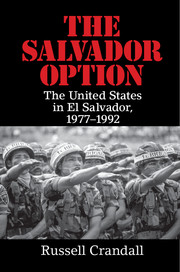Book contents
- Frontmatter
- Dedication
- Epigraph
- Contents
- List of Figures
- List of Organizations
- Acknowledgments
- 1 Introduction
- PART ONE EL SALVADOR IN THE COLD WAR
- PART TWO JIMMY CARTER
- PART THREE RONALD REAGAN
- 19 Reagan Arrives
- 20 Reagan and Salvador
- 21 El Mozote
- 22 Another Vietnam
- 23 Solidarity
- 24 Troop Cap and Certifying Human Rights
- 25 Reagan Gambles on Elections, 1982
- 26 The Shultz Doctrine
- 27 Human Rights
- 28 Henry Kissinger
- 29 Contras
- 30 “Elections Yes, Dialogue No,” 1984 Presidential Election
- 31 La Palma
- 32 Esquipulas
- 33 Counterinsurgency I
- 34 Counterinsurgency II
- 35 Zona Rosa
- 36 Air War
- 37 José Napoleón Duarte
- 38 Iran-Contra
- PART FOUR GEORGE H. W. BUSH
- PART FIVE POSTWAR
- Notes
- Bibliography
- Index
25 - Reagan Gambles on Elections, 1982
from PART THREE - RONALD REAGAN
Published online by Cambridge University Press: 05 June 2016
- Frontmatter
- Dedication
- Epigraph
- Contents
- List of Figures
- List of Organizations
- Acknowledgments
- 1 Introduction
- PART ONE EL SALVADOR IN THE COLD WAR
- PART TWO JIMMY CARTER
- PART THREE RONALD REAGAN
- 19 Reagan Arrives
- 20 Reagan and Salvador
- 21 El Mozote
- 22 Another Vietnam
- 23 Solidarity
- 24 Troop Cap and Certifying Human Rights
- 25 Reagan Gambles on Elections, 1982
- 26 The Shultz Doctrine
- 27 Human Rights
- 28 Henry Kissinger
- 29 Contras
- 30 “Elections Yes, Dialogue No,” 1984 Presidential Election
- 31 La Palma
- 32 Esquipulas
- 33 Counterinsurgency I
- 34 Counterinsurgency II
- 35 Zona Rosa
- 36 Air War
- 37 José Napoleón Duarte
- 38 Iran-Contra
- PART FOUR GEORGE H. W. BUSH
- PART FIVE POSTWAR
- Notes
- Bibliography
- Index
Summary
With a fascist dictatorship [the Christian Democratic/military junta] the only way to get them to understand anything is with force. Sadly, the Reagan administration sustains this dictatorship.
– Fermán Cienfuegos, FMLN commanderThere is no mistaking that the decisive battle for Central America is under way in El Salvador.
– Thomas O. Enders, Assistant Secretary of State for Inter-American AffairsIn late February 1981, soon after the White House had announced its expanded military and economic aid to the embattled Salvadoran government, the FMLN/FDR invited the Reagan administration to engage in direct negotiations to end the war. This guerrilla overture might have been a result of the failure of the January 1981 final offensive to seize power, but also the FMLN might have decided to support negotiations as a “tactic” allowing them to gain “time and diplomatic advantage.” Whatever the motivations, the FMLN pursued “negotiations as a strategy.”
The State Department quickly rejected the rebels’ invitation, countering that “if the insurgents want to talk, they should address themselves to the Government of El Salvador.” And it was not only the guerrillas who were pushing negotiations. In the wake of a massacre of 30 civilians, orchestrated by the infamous Treasury Police, in the town of Soyapango in March, Democratic senators Paul Tsongas and Edward Kennedy, both of Massachusetts, contended that talks were “essential to end the military escalation and pursue a political solution to this conflict.” Little over a year later, the House of Representatives voted to urge the Reagan administration to press for “unconditional discussions between the guerrillas and the Salvadoran government.”
Assistant Secretary of State Thomas Enders's much-discussed speech on July 16, 1981, at the World Affairs Council in Washington appeared to provide the possibility of negotiations that the administration had theretofore resisted. Enders, scion of a patrician Republican family from New England, epitomized “the best and brightest” of his generation. In the 1960s, the towering six foot eight Enders had supported civil rights at home and the Vietnam War overseas. Enders's height meant he towered over CIA director William Casey and President Reagan. “His intellect was equally imposing,” Reagan's biographer Lou Cannon wrote, and might have intimidated other policymakers.
- Type
- Chapter
- Information
- The Salvador OptionThe United States in El Salvador, 1977–1992, pp. 261 - 274Publisher: Cambridge University PressPrint publication year: 2016



